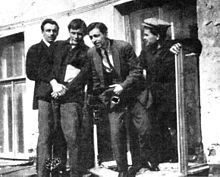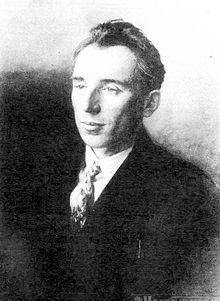Petro Pantsch

Petro Pantsch , ( Ukrainian Петро Панч , transliteration Petro PANC , real name Petro Jossypowytsch Panchenko Ukrainian Петро Йосипович Панченко ; born June 22 . Jul / 4. July 1891 greg. In Walky , Kharkov Governorate , Russian Empire ; † 1. December 1978 in Kiev , Ukrainian SSR ) was a Ukrainian - Soviet writer .
Life
Petro Pantsch studied at the College of Surveying in Poltava and from 1916 in Odessa . Afterwards he was a soldier in the Russian Army in World War I and between 1917 and 1920 during the Ukrainian struggle for independence he was a soldier of the troops of the Ukrainian People's Republic and then in the Red Army . In the Ukrainian Soviet Republic he was a member of various writers' organizations in Kharkiv, where he worked as a newspaper editor from 1923 to 1932. In 1934 he moved to Kiev, where he also worked as an editor. From 1940 on he was a member of the CPSU .
As a member of the Ukrainian Writers' Union he lived from 1938 to 1958 in Rolit - House of Writers in Kiev, later a 2015 stolen memorial plaque hanging on the from him. During the Great Patriotic War he was editor-in-chief of the literature department of the radio station “Soviet Ukraine” in Ufa . He died at the age of 87 in Kiev and was buried there in the Baikowe cemetery .
plant
His first publications were collections of short stories about the civil war and the early years of the new Ukrainian economic policy and were published between 1923 and 1926. This was followed by a cycle of novellettes in 1926/27 in which he wrote about events in pre-revolutionary Ukraine up to the October Revolution and the end of the First World War. From 1930 his main topic was forced collectivization . He also wrote a historical novel in 1954 and his memoirs in 1965, and he also wrote many children's books. His works were published in a collective edition of 5 volumes between 1971 and 1981. His books were written in a realistic style free of formalism. Due to his loyalty to the political leadership, he did not add anything new to literature, but was hailed as the founder of Ukrainian Soviet prose.
Honors
Petro Pantsch received numerous orders and honors, including twice the Order of Lenin , the Order of the Red Star , the Badge of Honor of the Soviet Union , the Order of Friendship of Peoples and the 1966 Taras Shevchenko Prize .
Web links
- Profile of Petro Pantsch on the website of the Taras Shevchenko Prize Committee (Ukrainian)
Individual evidence
- ↑ a b Entry on Panch, Petro in the Encyclopedia of Ukraine ; accessed on March 19, 2017 (Ukrainian)
- ↑ a b c Biography of Petro Pantsch on the website of the Baikowe cemetery; accessed on March 19, 2017 (Russian)
- ^ Entry on Petro Pantsch in the Encyclopedia of the History of Ukraine; accessed on March 19, 2017 (Ukrainian)
- ↑ Unknown steal memorial plaques in Kiev on espreso.tv November 17, 2015; accessed on March 19, 2017 (Ukrainian)
| personal data | |
|---|---|
| SURNAME | Pantsch, Petro |
| ALTERNATIVE NAMES | Pantschenko, Petro Jossypowytsch (full name); Панч, Петро (Ukrainian); Panč, Petro (uk-latn); Панченко, Петро Йосипович (Ukrainian) |
| BRIEF DESCRIPTION | Ukrainian-Soviet writer |
| DATE OF BIRTH | 4th July 1891 |
| PLACE OF BIRTH | Walky , Kharkov Governorate , Russian Empire |
| DATE OF DEATH | December 1, 1978 |
| Place of death | Kiev , Ukrainian SSR |
